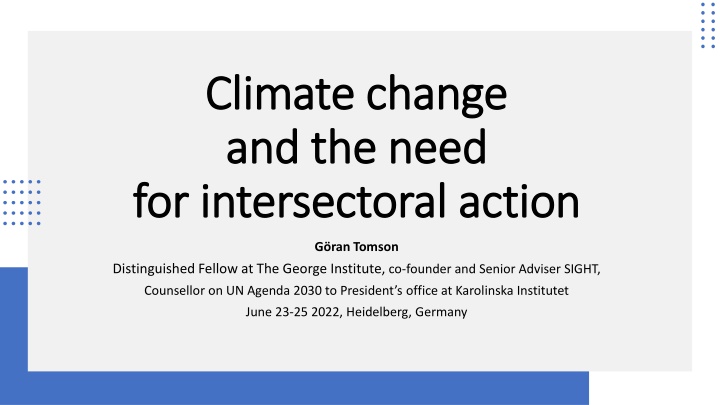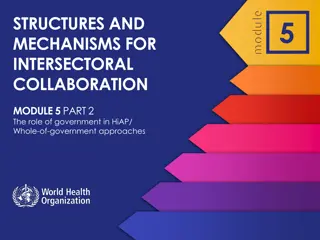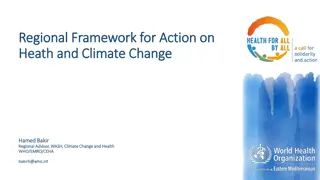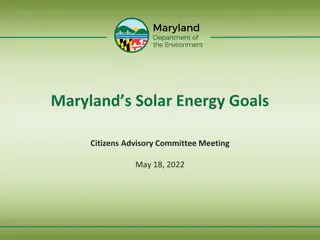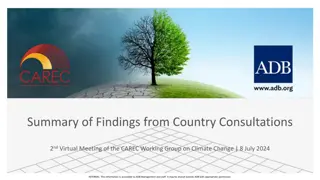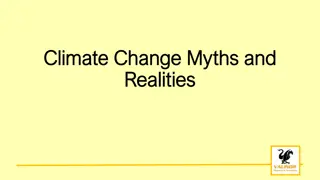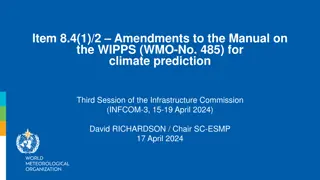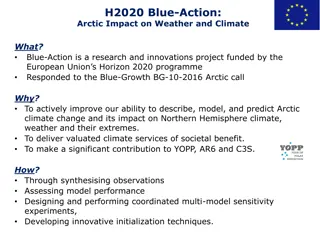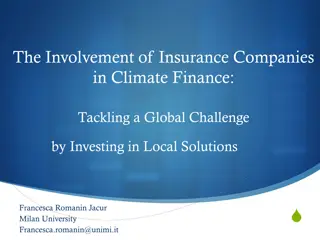Addressing Climate Change Through Intersectoral Action: Insights and Recommendations
Climate change necessitates intersectoral action, requiring collaborative efforts from various sectors to protect both people and the planet. To overcome barriers and promote facilitators of intersectoral action, key strategies include enhancing political support, fostering executive leadership, and promoting shared goals and accountability. Moving forward, the focus should be on framing inclusive visions, defining clear roles for ministries, and ensuring systematic monitoring and accountability. Localizing agendas and integrating with mainstream processes like SDG reviews are crucial for sustained progress.
Download Presentation

Please find below an Image/Link to download the presentation.
The content on the website is provided AS IS for your information and personal use only. It may not be sold, licensed, or shared on other websites without obtaining consent from the author.If you encounter any issues during the download, it is possible that the publisher has removed the file from their server.
You are allowed to download the files provided on this website for personal or commercial use, subject to the condition that they are used lawfully. All files are the property of their respective owners.
The content on the website is provided AS IS for your information and personal use only. It may not be sold, licensed, or shared on other websites without obtaining consent from the author.
E N D
Presentation Transcript
Climate change Climate change and the need and the need for intersectoral action for intersectoral action G ranTomson Distinguished Fellow at The George Institute, co-founder and Senior Adviser SIGHT, Counsellor on UN Agenda 2030 to President s office at Karolinska Institutet June 23-25 2022, Heidelberg, Germany
Tackling the politics of intersectoral action for the health of people and the planet Tackling the politics of intersectoral action for the health of people and the planet Professor G ran Tomson Distinguished Fellow, The George Institute Counsellor on UN Agenda 2030 to President s Office, Karolinska Institutet, Sweden Co-Founder, SIGHT, Royal Swedish Academy of Sciences, Sweden Sir Andrew Haines Professor, Environmental Change and Public Health, LSHTM, UK Professor Ole Petter Ottersen President, Karolinska Institutet, Sweden Dr Shyama Kuruvilla Senior Strategic Advisor, World Health Organization, Switzerland Dr Jemilah Mahmood Executive Director, Sunway Centre for Planetary Health, Sunway University, Malaysia Anastasia Alden Communications Manager, The George Institute for Global Health, UK Maarinke van der Meulen Programme Manager, Thought Leadership, The George Institute for Global Health, Australia
Barriers Barriers and Barriers and facilitators of facilitators of intersectoral intersectoral action action Lack of political support Inadequate leadership and links across sectors Organisational and institutional constraints Facilitators Executive leadership Shared cross sectoral goals and coordination Civic mobilisation Accountability Source: Buse K, Tomson G, Kuruvilla S, Mahmood J, Alden A, Van Der Meulen M, et al. Tackling the politics of intersectoral action for the health of people and planet. BMJ [Internet]. 2022 Jan 26;376(e068124):1 9. Available from: http://dx.doi.org/10.1136/bmj-2021-068124 3
The way forward Increase attention to framing visions that transcend sectoral goals and compelling narratives that motivate & mobilise politicians and public More explicit divisions of labour: which ministries should initiate and lead on different intersectoral actions on climate-health issues Localise agendas and legislate to sustain gains Ensure more systematic and independent monitoring to ensure accountability Link the intersectoral action agenda to more mainstream processes, such as the SDG reviews
Key Message 1 Key Message 1 The undermining of natural systems by human activities represents a potential existential crisis for the health of humanity However, many actions to address environmental change taken in sectors including energy, transport, agriculture, built environment and industry, have potential co-benefits for health Emphasising these actions could help to motivate more ambitious intersectoral action (ISA) Source: Buse K, Tomson G, Kuruvilla S, Mahmood J, Alden A, Van Der Meulen M, et al. Tackling the politics of intersectoral action for the health of people and planet. BMJ [Internet]. 2022 Jan 26;376(e068124):1 9. Available from: http://dx.doi.org/10.1136/bmj-2021-068124 5
Key Message 2 Key Message 2 Such ISA is, however, beset by political challenges, as evidenced by the watered- down commitments to action that emerged from the recent COP26 summit in Glasgow Bringing these political barriers and enablers into sharp focus is crucial to achieve the ISA needed to protect and promote planetary health Source: Buse K, Tomson G, Kuruvilla S, Mahmood J, Alden A, Van Der Meulen M, et al. Tackling the politics of intersectoral action for the health of people and planet. BMJ [Internet]. 2022 Jan 26;376(e068124):1 9. Available from: http://dx.doi.org/10.1136/bmj-2021-068124 6
Key Message 3 Key Message 3 Literature from the fields of health, climate, sustainability, governance, political science, and public administration all point to a set of common barriers Barriers include outdated institutions and the influence of vested interests and the limited ability of evidence and technocratic approaches on their own to shift the political dial Enablers include political demands arising from the social movements that are pressuring governments to confront climate breakdown and its impacts on human health in an integrated way Source: Buse K, Tomson G, Kuruvilla S, Mahmood J, Alden A, Van Der Meulen M, et al. Tackling the politics of intersectoral action for the health of people and planet. BMJ [Internet]. 2022 Jan 26;376(e068124):1 9. Available from: http://dx.doi.org/10.1136/bmj-2021-068124 7
Key Message 4 Key Message 4 Going forward, the key to unlocking the potential for ISA will be visionary agents in executive positions, defining ambitious, long-term and shared goals, motivated to action by the climate movement with its young, growing and politicized membership, and held to account by independent monitoring arrangements linked to existing political processes. Source: Buse K, Tomson G, Kuruvilla S, Mahmood J, Alden A, Van Der Meulen M, et al. Tackling the politics of intersectoral action for the health of people and planet. BMJ [Internet]. 2022 Jan 26;376(e068124):1 9. Available from: http://dx.doi.org/10.1136/bmj-2021-068124 8
Climate emergency imperative for intersectoral Climate emergency imperative for intersectoral action action Source: Buse K, Tomson G, Kuruvilla S, Mahmood J, Alden A, Van Der Meulen M, et al. Tackling the politics of intersectoral action for the health of people and planet. BMJ [Internet]. 2022 Jan 26;376(e068124):1 9. Available from: http://dx.doi.org/10.1136/bmj-2021-068124
Thinking politically about intersectoral action Thinking politically about intersectoral action the three I s the three I s In considering ISA it is important to ascertain the underlying distribution and exercise of power by those involved. Hence, the extent to which ISA facilitators can be realised and barriers overcome depends on the associated political dynamics (who gets what, when, and how). This is reflected in the policies and policy environments associated with ISA, and these are influenced by the three I s: Ideologies - ideas, values and beliefs that influence political positions and the framing employed to inspire action Interests - incentives facing stakeholders to engage on specific issues and the power they wield as well as the commitment with which those interests are pursued Institutions - structural factors that shape the rules governing policy processes Source: Buse K, Tomson G, Kuruvilla S, Mahmood J, Alden A, Van Der Meulen M, et al. Tackling the politics of intersectoral action for the health of people and planet. BMJ [Internet]. 2022 Jan 26;376(e068124):1 9. Available from: http://dx.doi.org/10.1136/bmj-2021-068124 10
Applying a political lens Applying a political lens BARRIERS Lack of political support The lack of political support to impose shared cross sectoral goals across fragmented bureaucratic structures is a substantial constraint to ISA. A signal that those in authority value such action is needed to facilitate and incentivise collaboration; and to ensure accountability mechanisms to drive, chart, and correct progress. Inadequate leadership and links across sectors With the imbalance of economic power between government and industry, leadership for effective regulation to address critical public issues across multiple sectors is increasingly challenging and inadequate Organisational and institutional constraints Narrow specialisation may not value collaboration and cooperation nor foster mindsets and skillsets amenable to working with other sectors, as well as encouraging inaccessible, specialist language. These weaknesses might result in a failure to consider incentives and goals pursued by other sectors, which is essential for sustainable collaboration. Source: Buse K, Tomson G, Kuruvilla S, Mahmood J, Alden A, Van Der Meulen M, et al. Tackling the politics of intersectoral action for the health of people and planet. BMJ [Internet]. 2022 Jan 26;376(e068124):1 9. Available from: http://dx.doi.org/10.1136/bmj-2021-068124 11
Applying a political lens (cont.) Applying a political lens (cont.) FACILITATORS Executive leadership Leadership that transcends ministries, sectors, or departments, and that is exercised at all levels, is critical. It creates the ultimate political will for cooperation in that it is authoritative, can shape mandates, and demand compliance. Shared cross sectoral goals and coordination Structural mechanisms established by governments for coordination across ministries through joint committees, shared workplans, and pooled budgets are crucial to ISA, as exemplified in health in all policy approaches. From a political perspective, the success of these initiatives depends on acknowledging and accommodating diverse and sometimes competing interests and building trust. Civic mobilization Changing behaviour for human and planetary health requires interaction between the public (both as citizens and consumers), policy makers, and private sector leaders. Accountability Robust governance and accountability mechanisms are a prerequisite. Legislation in support of ISA, often in response to political mobilisation, draws on established mechanisms in government to ensure accountability, and moreover can have a lasting effect beyond any particular administration. Examples include the Public Health Act in South Australia. Source: Buse K, Tomson G, Kuruvilla S, Mahmood J, Alden A, Van Der Meulen M, et al. Tackling the politics of intersectoral action for the health of people and planet. BMJ [Internet]. 2022 Jan 26;376(e068124):1 9. Available from: http://dx.doi.org/10.1136/bmj-2021-068124 12
